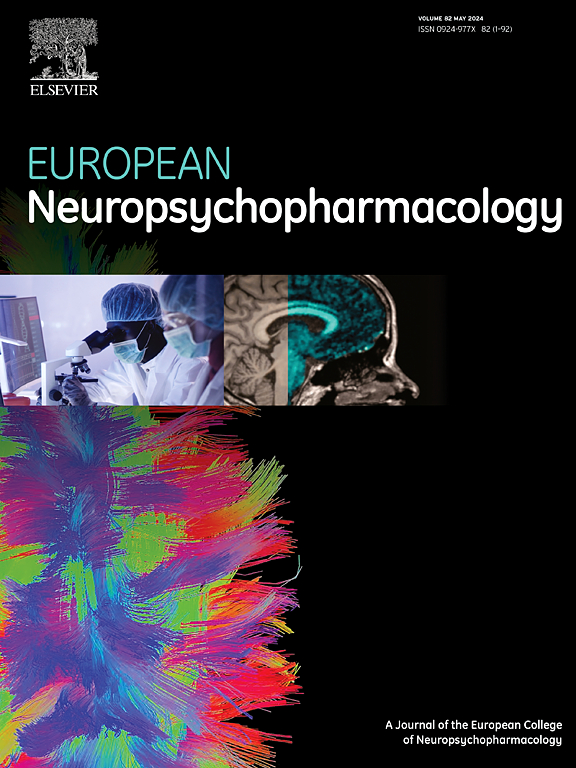Efficacy and safety profile of oral creatine monohydrate in add-on to cognitive-behavioural therapy in depression: An 8-week pilot, double-blind, randomised, placebo-controlled feasibility and exploratory trial in an under-resourced area
IF 6.1
2区 医学
Q1 CLINICAL NEUROLOGY
引用次数: 0
Abstract
Pre-clinical and clinical evidence proposes that creatine monohydrate, an affordable nutraceutical, could be a useful adjunct to conventional antidepressant treatments. In this pilot feasibility and exploratory study, we investigate the 8-week effects of creatine in addition to cognitive-behavioural therapy (CBT) versus placebo plus CBT in depression. For the primary efficacy outcome of change in Patient Health Questionnaire-9 depression score at study endpoint, we used mixed-model repeated measures analysis of covariance. Logistic regressions were employed to assess acceptability (any-cause dropouts), tolerability (dropouts for adverse events), and safety (patients experiencing one or more adverse events). We calculated effect sizes adjusted for age, sex, and baseline depression score. One-hundred participants (50 females, mean age= 30.4 ± 7.4 years) with depression (mean PHQ-9 = 17.6 ± 6.3) were randomised to either creatine+CBT (N = 50) or placebo+CBT (N = 50). At 8 weeks, PHQ-9 scores were lower in both study arms, but significantly more so in participants taking creatine (mean difference= -5.12). Treatment discontinuations due to any cause and to adverse events, and proportion of participants with at least one adverse event were comparable between study arms. This hypothesis-generating trial suggests that creatine could be a useful and safe supplement to CBT for depression. Longer and larger clinical trials are warranted.
口服一水肌酸对抑郁症认知行为疗法的疗效和安全性:在资源匮乏地区进行的为期 8 周的双盲、随机、安慰剂对照可行性和探索性试验。
临床前和临床证据表明,一水肌酸这种经济实惠的营养保健品可以作为传统抗抑郁治疗的有效辅助药物。在这项试验性可行性和探索性研究中,我们调查了肌酸在认知行为疗法(CBT)基础上与安慰剂加 CBT 相比对抑郁症患者的 8 周疗效。对于研究终点时患者健康问卷-9 抑郁症评分变化这一主要疗效结果,我们采用了混合模型重复测量协方差分析法。逻辑回归用于评估可接受性(任何原因的退出)、耐受性(因不良事件退出)和安全性(出现一次或多次不良事件的患者)。我们计算了根据年龄、性别和基线抑郁评分调整后的效应大小。100 名抑郁症患者(50 名女性,平均年龄= 30.4 ± 7.4 岁)(平均 PHQ-9 = 17.6 ± 6.3)被随机分配到肌酸+CBT(50 人)或安慰剂+CBT(50 人)治疗方案中。8周时,两个研究组的PHQ-9评分均有所下降,但服用肌酸的参与者的PHQ-9评分明显更高(平均差异=-5.12)。因任何原因和不良事件导致的治疗中断,以及出现至少一种不良事件的参与者比例,在各研究组之间不相上下。这项提出假设的试验表明,肌酸可以作为抑郁症 CBT 的一种有用且安全的补充。有必要进行更长时间和更大规模的临床试验。
本文章由计算机程序翻译,如有差异,请以英文原文为准。
求助全文
约1分钟内获得全文
求助全文
来源期刊

European Neuropsychopharmacology
医学-精神病学
CiteScore
10.30
自引率
5.40%
发文量
730
审稿时长
41 days
期刊介绍:
European Neuropsychopharmacology is the official publication of the European College of Neuropsychopharmacology (ECNP). In accordance with the mission of the College, the journal focuses on clinical and basic science contributions that advance our understanding of brain function and human behaviour and enable translation into improved treatments and enhanced public health impact in psychiatry. Recent years have been characterized by exciting advances in basic knowledge and available experimental techniques in neuroscience and genomics. However, clinical translation of these findings has not been as rapid. The journal aims to narrow this gap by promoting findings that are expected to have a major impact on both our understanding of the biological bases of mental disorders and the development and improvement of treatments, ideally paving the way for prevention and recovery.
 求助内容:
求助内容: 应助结果提醒方式:
应助结果提醒方式:


